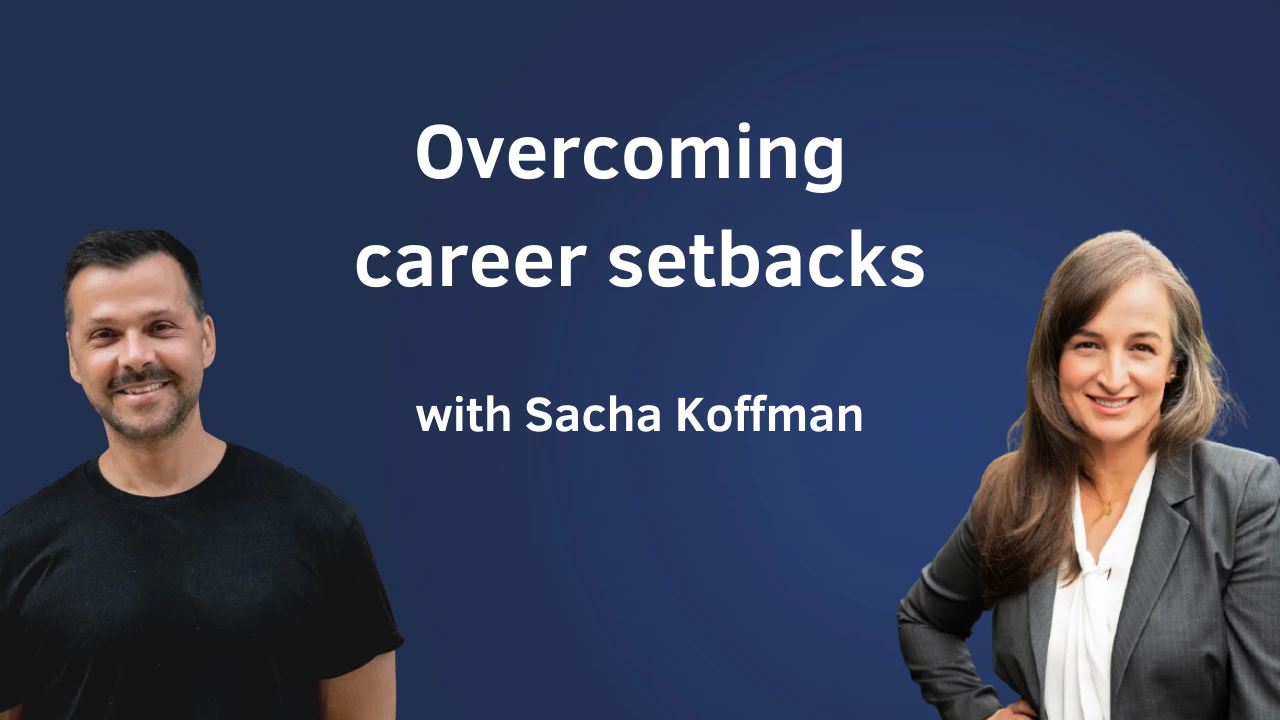Episode 122 - How Successfull Professionals Found the Strength and Wisdom to Turn Things Around When They Had to Recover From Setbacks, with Sacha Koffman

I have always been fascinated by professionals that recover from career setbacks and achieve great things. There is a great deal of effort into their recovery, from working on their mental health, remaining on course towards their goals, and ensuring they have the best team to provide the proper support and advice. I often wonder how they found the strength and wisdom to turn things around.
This is why I invited my friend Sacha Koffman to chat with me for this episode. Sacha is an executive with over twenty-five years of commercial experience. He's worked at some of the best-known global consulting firms and corporate brands, always in learning and leadership development roles. More recently, Sacha has also embraced this entrepreneurial side and is the co-founder of two startups that have grown successfully.
Early in his career, Sacha faced enormous challenges. His situation, which he will explain in our interview, made him feel lonely, and it was difficult to talk about it with anyone, let alone open up about it at work. This, in turn, led to further troubles in both his career and personal life.
But this story has a happy ending. And this is why I really wanted to interview Sacha. Today, Sacha is an influential leadership and well-being coach, consultant, and facilitator with a passion for helping individuals, teams, and organizations be the best they can be.
He leads a life of purpose, follows his passions, and is one of the most generous, humble, and giving persons I know. In this episode of The Job Hunting Podcast, he opens up about these challenges and shares how being authentically vulnerable saved his career and ultimately led him on his crusade to help others navigate life obstacles.
It's a long episode, folks, so grab your coffee and your tea because it's 100% worth listening. We start by Sacha explaining the link between listening and empathy. We go on from there, moving slowly but surely from his narrative as the excellent leadership expert to him, telling more and more about his journey.
An executive career spans many decades, so it's essential to understand that you may encounter a setback at some stage. Listen to this episode to realize that setbacks can be an opportunity to discover great things about yourself and that there are amazing opportunities on the other side of failure.
About our guest Sacha Koffman
Sacha Koffman is an executive with over twenty-five years of commercial experience. He's worked at some of the best-known global consulting firms and corporate brands, always in learning and leadership development roles. More more, Sacha embraced this entrepreneurial side, starting two startups that have grown successfully. You can follow Sacha Koffman on LinkedIn.
Resources mentioned in this episode
Free Resource for Job Hunters: Optimized job search schedule
Transcript of this episode
About the Host
Hello, I’m Renata Bernarde, the Host of The Job Hunting Podcast. I’m also an executive coach, job hunting expert, and career strategist. I teach professionals (corporate, non-profit, and public) the steps and frameworks to help them find great jobs, change, and advance their careers with confidence and less stress.
If you are an ambitious professional who is keen to develop a robust career plan, if you are looking to find your next job or promotion, or if you want to keep a finger on the pulse of the job market so that when you are ready, and an opportunity arises, you can hit the ground running, then this podcast is for you.
In addition to The Job Hunting Podcast, , on my website, I have developed a range of courses and services for professionals in career or job transition. And, of course, I also coach private clients.
Contact Renata Bernarde
I’m determined to help you! I want you to feel empowered, nail your next job, and have the career you want.
My free resources for job hunters: The Optimized Job Search: Weekly Schedule & Masterclass.
Learn more about my services, courses, and group coaching: RenataBernarde.com
